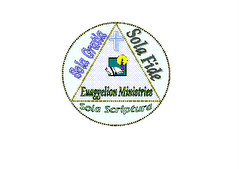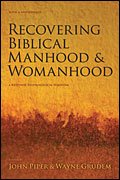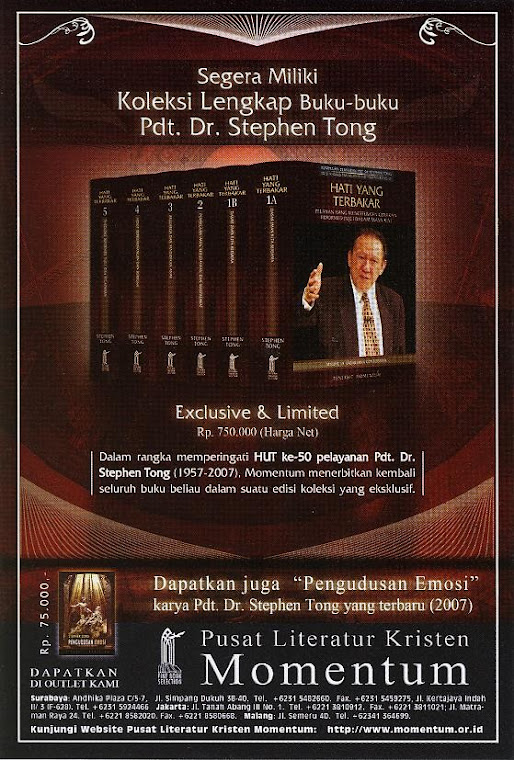Book
A CHRISTIAN MANIFESTO
oleh: Rev. Francis August Schaeffer, D.D., D.Litt., LL.D. (HC)
Publisher: Crossway Books, U.S.A., 1982
Simple description:
How should Christians live in this world? Should Christians compromise in this world? NO. The Bible teaches us that we must be the light of the world (Matt. 5:16) by showing the light of Christ in this postmodern era. How do we show the light of Christ? We do it by proclaiming the truth of God in our daily life. When we proclaim the truth of God, we must face our world’s philosophies and challenge them. To equip Christians, Rev. Dr. Francis A. Schaeffer wrote a book, “A Christian Manifesto” to teach us about the morality and freedom in society in Christian perspective. In this book, he explained that our (postmodern) era is a secular world with a secular world view, that is (atheist) humanism who rebels against God. A slogan of humanism is freedom. It affects humans in their daily life: education, morality, politics, law, etc. When they think that they want to be free without God, they don’t realize that they face chaos. Then, Dr. Schaeffer challenges the secular world view and gives (another) world view toward morality and freedom in Christian perspective. Furthermore, in last chapters, he challenges Christians to do what God wants them to do by showing the truth of God about true morality and freedom in this corrupted era.
Endorsement:
“Schaeffer was right. Today, we need leaders who can show us how to operate in a way that does not neglect or enshrine politics. We need to discern which behaviors by Christians are helpful and which are not.”
Prof. Marvin Olasky, Ph.D.
(the provost of The King’s College and editor-in-chief, World Magazine; Bachelor of Arts—B.A. in American Studies from Yale University, U.S.A. and Doctor of Philosophy—Ph.D. in American Culture from University of Michigan, U.S.A.)
“When I went to L’Abri many years ago as an agnostic, it was the first time I encountered Christians who engaged with cultural and intellectual world. A leader distinguished by his integrity and authenticity. Francis Schaeffer shows how the richness of biblical truth illuminates the course of history as well as our individual lives.”
Dr. Nancy Randolph Pearcey
(the Francis A. Schaeffer Scholar at the World Journalism Institute, a senior fellow at the Discovery Institute, and author: Total Truth; Master of Arts—M.A. in Biblical Studies from Covenant Theological Seminary, St. Louis, then pursued further graduate work in the history of philosophy at the Institute for Christian Studies in Toronto (with emphases on ancient and Reformational philosophy).)
“I can think of no one who has had more impact on evangelical theology and social policy in the last three decades than Francis Schaeffer. Dr. Schaeffer had enormous influence on a whole generation of baby-boomer evangelicals, calling us to engagement with society and inspiring us to be the salt and light that Jesus commanded. The culmination of Schaeffer’s call for the church to be the church were How Should We Then Live? and A Christian Manifesto. We all owe Dr. Schaeffer an incalculable debt.”
Richard Land, D.Phil.
(President of The Southern Baptist Convention’s Ethics and Religious Liberty Commission; Bachelor of Arts—A.B. from Princeton University, U.S.A.; Master of Theology—Th.M. from New Orleans Baptist Theological Seminary; and Doctor of Philosophy—D.Phil. from Oxford University, U.K.)
“Go to any evangelical Christian gathering and ask twenty people the simple question: ‘What single person has most affected your thinking and your worldview?’ If Francis Schaeffer doesn’t lead the list of answers, and probably by a significant margin, I’d ask for a recount.”
Joel Belz, M.A.
(founder and CEO of God’s World Publications and a member and elder in the Presbyterian Church in America; B.A. in English from Covenant College in Lookout Mountain, GA and Master of Arts—M.A. from in communications from the University of Iowa)
Biography of Rev. Dr. Francis A. Schaeffer:
Rev. Francis August Schaeffer, D.D., D.Litt., LL.D. (HC) (30 January 1912 – 15 May 1984)[1] was an American Evangelical Christian theologian, philosopher, and Presbyterian pastor. In 1948, the Schaeffer family moved to Switzerland and in 1955 established the community called L'Abri (French for "the shelter"). He is most famous for his writings and his establishment of the L'Abri community in Switzerland. Opposed to theological modernism, Schaeffer promoted a more traditional Protestant faith and a presuppositional approach to Christian apologetics, which he believed would answer the questions of the age. In 1935, Schaeffer graduated magna cum laude from Hampden-Sydney College. The same year he married Edith Seville, the daughter of missionary parents who had been with China Inland Mission founded by Hudson Taylor. Schaeffer then enrolled at Westminster Theological Seminary in the fall and studied under Cornelius Van Til and J. Gresham Machen. In 1954, Schaeffer was awarded the honorary Doctor of Divinity (D.D.) degree from Highland College in Long Beach, California. In 1971, Schaeffer received the honorary Doctor of Letters (D.Litt.) degree from Gordon College in Wenham, Massachusetts. In 1982, John Warwick Montgomery nominated Schaeffer for an honorary Doctor of Laws (LL.D.) degree, which was conferred in 1983 by the Simon Greenleaf School of Law, Anaheim, California in recognition of his apologetic writings and ministry. Francis A. Schaeffer wrote twenty-two books, which cover a range of spiritual issues. They can be roughly split into five sections, as in the edition of his Complete Works (ISBN 0-89107-347-7):
• A Christian View of Philosophy and Culture: The first three books in this block are known as Schaeffer's "trilogy," laying down the apologetical, philosophical, epistemological, and theological foundation for all his work.
o The God Who Is There: Deals with the existence and relevance of God, and how modern man came to first distance himself from, and ultimately disbelieve, God as revealed by the Bible.
o Escape from Reason: How the rejection of the Biblical God causes man to lose contact with reality and reason.
o He Is There and He Is Not Silent: How God speaks to man through the Bible on the three philosophically fundamental areas of metaphysics, morals, and epistemology.
o Back to Freedom and Dignity: An answer to B. F. Skinner’s Beyond Freedom and Dignity, arguing that freedom and dignity of man are God-given and therefore can't be left aside without dire consequences.
• A Christian View of the Bible as Truth
o Genesis in Space and Time: Argues that an almost literalist view of Genesis as historically true is fundamental to the Christian faith.
o No Final Conflict
o Joshua and the Flow of Biblical History
o Basic Bible Studies: Biblical studies on the fundamentals of the faith.
o Art and the Bible
• A Christian View of Spirituality
o No Little People: Argues that Christians should never despair of having a significant life of realisations, small as they seem to be.
o True Spirituality: The spiritual foundation for Schaeffer's work, as a complement to the theological and philosophical approach of most other books. Useful for gaining a balanced view of the whole of Schaeffer's life and ministry.
o The New Super-Spirituality: Claims the intellectual decadence of students and the counter-culture from the late sixties to the early seventies can be traced back to the conformism of their fathers, only with fewer moral absolutes, and predicts the contamination of the church. Offers an analysis of Postmodernism.
o Two Contents, Two Realities: First presented as a position paper at the First International Congress on World Evangelization at Lausanne, Switzerland in 1974.
• A Christian View of the Church
o The Church at the End of the Twentieth Century
o The Church before the Watching World
o The Mark of the Christian: Analyses the balance between the holiness of God and the love of God in the spiritual life of the Bible-believing Christian. (Online E-text
o Death in the City
o The Great Evangelical Disaster
• A Christian View of the West
o Pollution and the Death of Man. A Christian response to issues concerning ecology.
o How Should We Then Live? The Rise and Decline of Western Thought and Culture. This is also a film/video series produced and directed by his son Frank Schaeffer.
o Whatever Happened to the Human Race? (with former Surgeon General Dr. C. Everett Koop). A Christian response to abortion, euthanasia, and infanticide. This is also a film/video series produced and directed by his son Frank Schaeffer.
o A Christian Manifesto: Christian principles for secular politics.
Source: http://en.wikipedia.org/wiki/Francis Schaeffer





